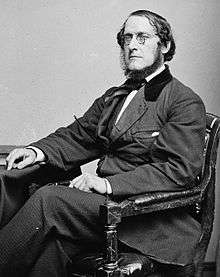James Brooks (politician)
James Brooks (November 10, 1810 – April 30, 1873) was a U.S. Representative from New York during the latter half of the American Civil War.
James Brooks | |
|---|---|
 | |
| Member of the U.S. House of Representatives from New York | |
| In office March 4, 1867 – April 30, 1873 | |
| Preceded by | William E. Dodge |
| Succeeded by | Samuel S. Cox |
| Constituency | 8th district (1867–73) 6th district (1873) |
| In office March 4, 1863 – April 7, 1866 | |
| Preceded by | Isaac C. Delaplaine |
| Succeeded by | William E. Dodge |
| Constituency | 8th district |
| In office March 4, 1849 – March 3, 1853 | |
| Preceded by | Horace Greeley |
| Succeeded by | John Wheeler |
| Constituency | 6th district |
| Personal details | |
| Born | November 10, 1810 Portland, Maine, U.S. |
| Died | April 30, 1873 (aged 62) Washington, D.C., U.S. |
| Resting place | Green-Wood Cemetery, Brooklyn, N.Y. |
| Citizenship | US |
| Political party | Whig Democrat |
| Alma mater | Waterville College |
| Profession | Politician |
Personal and education
He was born on November 10, 1810, in Portland, Maine. As a student, he attended public schools and then the academy at Monmouth, Maine. By the age of 16, he was teaching school, in Lewiston, Maine. He graduated from Waterville College (now Colby College) in 1831.
While studying law, Brooks also worked as an editor for the Portland Advertiser.
Political career
After graduation, he worked as the Advertiser's Washington correspondent. He served as a member of the Maine House of Representatives in 1835 and lost a Congressional election in 1836. After losing, he moved to New York City and founded the New York Daily Express, where he was editor-in-chief for the rest of his life. He was a member of the New York State Assembly (New York Co., 16th D.) in 1848.
He was elected, as a Whig, to the Thirty-first and Thirty-second Congresses (March 4, 1849 - March 3, 1853). He lost a race for re-election in 1852 and resumed his editorial pursuits.
Brooks was elected as a Democrat to the Thirty-eighth Congress (March 4, 1863 – March 3, 1865). He presented credentials as a Member-elect to the Thirty-ninth Congress, after a disputed election; he served from March 4, 1865, until April 7, 1866. He was succeeded by William E. Dodge, who had contested the election and won his case.
In 1866, Brooks was elected as a Democrat to the Fortieth Congress, and to the three succeeding Congresses. He was a Member of Congress until his death in 1873.
Brooks served as member of the New York State constitutional convention in 1867. That same year, he was appointed a government director of the Union Pacific Railroad.
Brooks was censured by the House of Representatives on February 27, 1873, for attempted bribery, in connection with the Crédit Mobilier of America scandal.
Death
Brooks died in Washington, D.C., April 30, 1873. He was interred at Green-Wood Cemetery, in Brooklyn, New York.
State Senator Erastus Brooks (1815–1886) was his brother.
See also
- List of United States Representatives expelled, censured, or reprimanded
- List of federal political scandals in the United States
- List of United States Congress members who died in office (1790–1899)
References
![]()
- United States Congress. "James Brooks (id: B000881)". Biographical Directory of the United States Congress. Retrieved on 2009-05-12.
External links
| U.S. House of Representatives | ||
|---|---|---|
| Preceded by Horace Greeley |
Member of the U.S. House of Representatives from New York's 6th congressional district 1849–1853 |
Succeeded by John Wheeler |
| Preceded by Isaac C. Delaplaine |
Member of the U.S. House of Representatives from New York's 8th congressional district 1863–1866 |
Succeeded by William E. Dodge |
| Preceded by William E. Dodge |
Member of the U.S. House of Representatives from New York's 8th congressional district 1867–1873 |
Succeeded by John D. Lawson |
| Preceded by Samuel S. Cox |
Member of the U.S. House of Representatives from New York's 6th congressional district 1873 |
Succeeded by Samuel S. Cox |